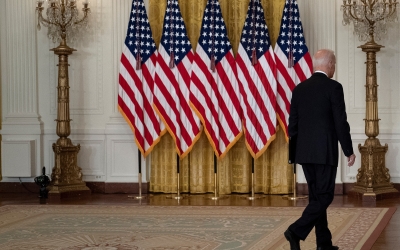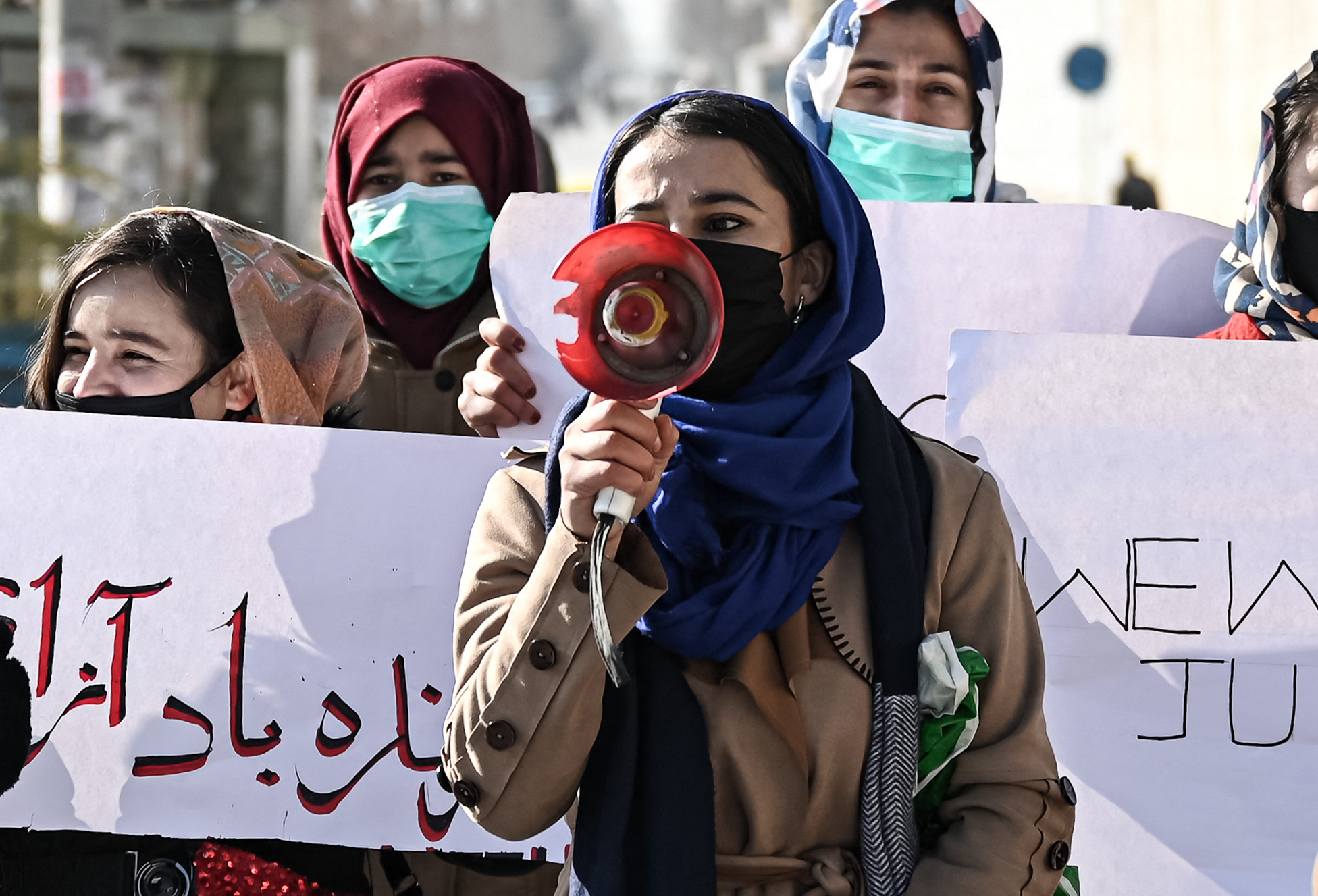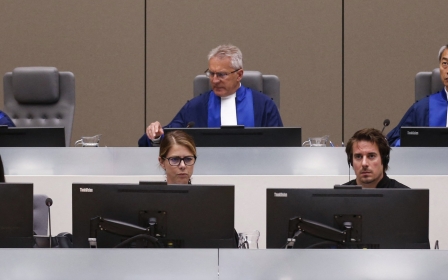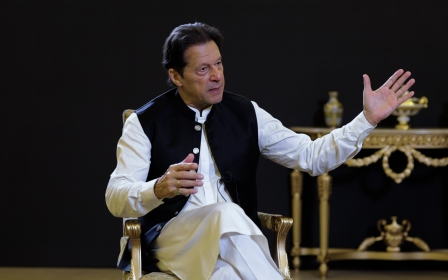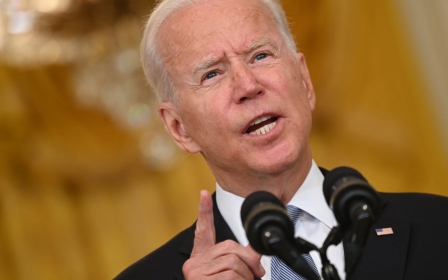Afghanistan: Can the Taliban survive the year ahead?

The fall of Kabul and the Taliban’s return to power were arguably the most shocking news stories to emerge from 2021, conveyed with the same PR savvy that characterised the group’s ramped-up campaign to oust foreign troops from Afghanistan.
Images of members of the Taliban posing triumphantly behind an ornate wooden desk at the presidential palace will forever illustrate the day a guerrilla force overthrew an elected government backed by the strongest militaries in the world.
As the year ends, a grim new reality emerges in Afghanistan. Mass starvation, economic collapse and brutal extrajudicial executions greet the new year
The image was a masterful stroke of propaganda, and for the eagle-eyed observer, the painting behind the desk was no less symbolic: it depicts a mid-18th-century scene in which a large crowd looks on as a Sufi mystic crowns the kneeling Aḥmad Shah Durrani, an ethnic Pashtun tribesman who founded the modern Afghan state.
The reasons for the Taliban takeover continue to be fiercely debated. Why did the Afghan army, after 20 years of first-world military training, armed with modern weapons and aircraft, collapse in less than two months? Why did the international community merely stand by and watch?
Then the final affront by US President Joe Biden. In his widely derided and tone-deaf remarks on 1 September, he cast blame on the Afghans themselves for their own misery, insulted the memory of fallen Afghan soldiers, and absolved his administration of any responsibility in the chaos of a bungled evacuation.
New MEE newsletter: Jerusalem Dispatch
Sign up to get the latest insights and analysis on Israel-Palestine, alongside Turkey Unpacked and other MEE newsletters
Grim new reality
As the year ends, a grim new reality emerges in Afghanistan. Mass starvation, economic collapse and extrajudicial executions greet the new year. The myth of a modern and more progressive Taliban 2.0, peddled by the Taliban’s own PR machine and amplified by the world’s most respected media outlets, continues to be discredited by ground reports of repressive policies toward women, reprisal killings and gross human rights violations.
Despite repeated assurances by erudite spokesmen such as Zabiullah Mujahid and the Doha-based Suhail Shaheen in the weeks after the takeover, the newly formed Taliban administration is anything but broad-based and inclusive. The international community, still reeling from scenes of a botched mass evacuation and grappling with an outpouring of refugees, watches fecklessly from afar, merely voicing "concerns", proclaiming “conditions” and declaring that “the Taliban will be measured by actions, not words”.
Afghans are caught between a rock and a hard place. Frozen international aid funds would help to alleviate the severe humanitarian crisis, but it would legitimise the Taliban rule. Some Afghans are calling for the release of the funds on humanitarian grounds, while others insist on using the funds as an incentive for the Taliban to yield on some of its repressive policies.
In either case, funds will be siphoned off by the government or free up other government funds for questionable activities. It is certainly the case that humanitarian concerns are not at the top of Taliban priorities.
Aside from serious concerns over the Taliban’s policies and governance abilities, there remains the significant threat of Afghanistan again being used as a safe haven and sanctuary for terrorism. It is widely assumed that a number of extrajudicial executions are part of the Taliban’s covert counterterrorism strategy against the Islamic State-affiliated Islamic State Khorasan Province (ISKP).
A Faustian bargain
One option would be some measure of counterterrorism assistance from the international community, but the Taliban is not close to any understandings with that community. For both sides, counterterrorism assistance would be a Faustian bargain. The Taliban would be forced to accept a return of foreign forces to Afghanistan, an option that is anathema to those who spent 20 years fighting. Correspondingly, the international community is barred from providing support to a UN-declared terrorist organisation.
While it may well be in the Taliban’s interest to combat the threat of ISKP, it cannot afford open cooperation with the international community and risk giving ISKP leverage in their narrative. As former US Special Envoy to Afghanistan Zalmay Khalilzad said in a recent interview, the Taliban “fear that if they make that statement [to cooperate with the US] it would help Daesh [Islamic State] by Daesh arguing that Talibs have sold out to the US."
Yet it is an unacceptable risk for the US to ignore the need. In late October, Colin Kahl, Under Secretary of Defence for Policy, testified to the Senate Armed Services committee that ISKP could build the capacity to plan and conduct international operations within six months if unchecked. No US administration can fail to act on such a clearly articulated threat, yet without external support, the Taliban is ineffectual in honoring that commitment to fight ISKP.
Without Taliban acquiescence or a deep understanding of the complexities of the changing landscape, how capable will the US prove to be in thwarting attacks by al-Qaeda and ISKP? It is likely that the post-2021 US “Over the Horizon” strategy will prove as ineffectual as it was pre-2001.
For the Taliban, the answer is straightforward. “We don’t need assistance from any side to ensure that the soil of Afghanistan is not used against other countries. We are capable to do so ourselves,” said Suhail Shaheen, in Doha. These words, however, offer little comfort to the Americans who condemn extrajudicial killings of suspects as a viable (or legal) counterterrorism strategy. The heavy-handed approach of night raids by CIA-backed strike forces backfired on the Americans and the government of Ashraf Ghani, and will likely do so to the Taliban as well.
2022 looms large for the Taliban. The fledgling government is grappling with unprecedented humanitarian and financial crises, international condemnation, some measure of popular backlash and a terrorist threat to its power and control. The Taliban foreign policy is impudent and indifferent to the world community, its economy is a shambles, and international aid is being withheld.
Such challenges would debilitate a popularly elected, internationally recognised government, but the Taliban’s seizing of power at the point of a gun has made these problems far more intractable. The Taliban have neither the resources nor the willingness to address these issues directly, and the post-withdrawal indifference of the international community may cement the suffering of the Afghan people for decades to come.
The views expressed in this article belong to the author and do not necessarily reflect the editorial policy of Middle East Eye.
Middle East Eye delivers independent and unrivalled coverage and analysis of the Middle East, North Africa and beyond. To learn more about republishing this content and the associated fees, please fill out this form. More about MEE can be found here.



